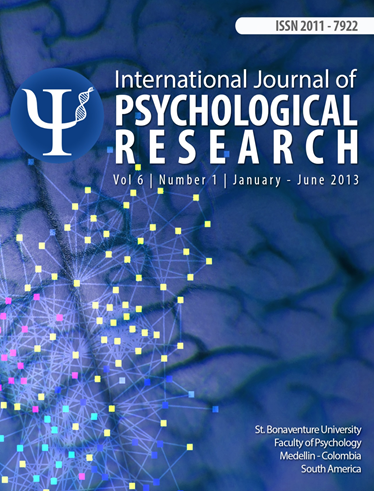Ver/Descargar
Cómo citar
Cuartas Arias, J. M., & López Jaramillo, C. (2013). DSM-5 Boom o Esperanza. International Journal of Psychological Research, 6(1), 6–7. https://doi.org/10.21500/20112084.693
Más formatos de cita
Términos de licencia
▼
The work that is sent to this journal must be original, not published or sent to be published elsewhere; and if it is accepted for publication, authors will agree to transfer copyright to International Journal of Psychological Research.
To give up copyright, the authors allow that, International Journal of Psychological Research, distribute the work more broadly, check for the reuse by others and take care of the necessary procedures for the registration and administration of copyright; at the same time, our editorial board represents the interests of the author and allows authors to re-use his work in various forms. In response to the above, authors transfer copyright to the journal, International Journal of Psychological Research. This transfer does not imply other rights which are not those of authorship (for example those that concern about patents). Likewise, preserves the authors rights to use the work integral or partially in lectures, books and courses, as well as make copies for educational purposes. Finally, the authors may use freely the tables and figures in its future work, wherever make explicit reference to the previous publication in International Journal of Psychological Research. The assignment of copyright includes both virtual rights and forms of the article to allow the editorial to disseminate the work in the manner which it deems appropriate.
The editorial board reserves the right of amendments deemed necessary in the application of the rules of publication.
To give up copyright, the authors allow that, International Journal of Psychological Research, distribute the work more broadly, check for the reuse by others and take care of the necessary procedures for the registration and administration of copyright; at the same time, our editorial board represents the interests of the author and allows authors to re-use his work in various forms. In response to the above, authors transfer copyright to the journal, International Journal of Psychological Research. This transfer does not imply other rights which are not those of authorship (for example those that concern about patents). Likewise, preserves the authors rights to use the work integral or partially in lectures, books and courses, as well as make copies for educational purposes. Finally, the authors may use freely the tables and figures in its future work, wherever make explicit reference to the previous publication in International Journal of Psychological Research. The assignment of copyright includes both virtual rights and forms of the article to allow the editorial to disseminate the work in the manner which it deems appropriate.
The editorial board reserves the right of amendments deemed necessary in the application of the rules of publication.
Resumen
Después de catorce años de revisión, la esperada actualización del Manual Diagnóstico y Estadístico de los Trastornos Mentales (Diagnostic and Statistical Manual of Mental Disorder, DSM), ha generado una gran controversia entre psiquiatras y psicólogos alrededor del mundo. Hasta ahora se sabe que la nueva versión (DSM-5) oficialmente presentada el 18 de mayo del año en curso, en el marco del congreso anual de la Asociación Americana de psiquiatría (American Psychiatric Association, APA), estará disponible en lengua española para inicios del 2014; sin embargo, las críticas y comentarios a favor y en contra de la nueva versión sugieren que aún no hay consenso en la comunidad científica para abordar la enfermedad mental; más allá del instructivo categorial diagnóstico que ha prevalecido en las versiones anteriores y que con la actual aún se mantiene en una buena parte del texto, la propuesta dimensional es articulada con el uso de subtipos clínicos, niveles de gravedad y la inclusión de síntomas transversales; que permiten entonces dar cuenta de un gradiente de deterioro o vulnerabilidad (Regier, Kuhl, & Kupfer, 2013).
Descargas
Los datos de descargas todavía no están disponibles.

































